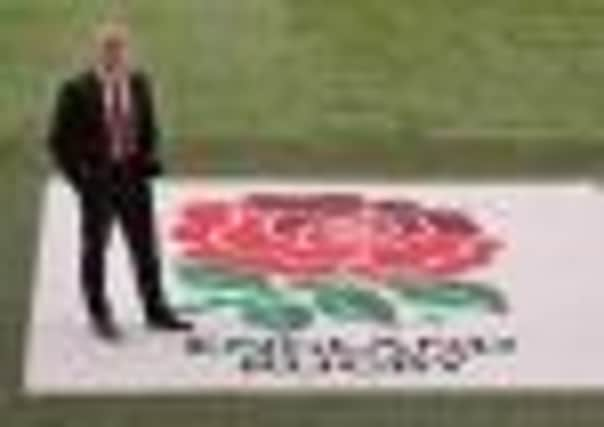Lancaster has deserved his chance to complete job he started so well


No longer is he the head coach for one tournament, tasked with righting the ship and leaving it in more experienced, capable hands to be steered into open waters.
Lancaster has steadied the ship all right.
Now he is the man deemed capable of moving it forward and taking England towards a bright new dawn.
Advertisement
Hide AdAdvertisement
Hide AdHe has also been seen as having gained enough experience in an impressive Six Nations campaign to wipe out the one area where his rivals for the permanent job – chiefly Nick Mallett – appeared to have him licked.
In truth, Lancaster had done so much good in less than three months with the England team that his claims had become impossible to ignore.
He oversaw an overhaul of their public image and a good percentage of their playing staff.
Results soon followed; a first win in Scotland for eight years, an improved performance against the eventual grand slam winners Wales, a victory in Paris that completed a record-setting three away wins in the northern hemipshere tournament.
Advertisement
Hide AdAdvertisement
Hide AdThrow in the coup de grace, a systematic destruction of Ireland to finish the Six Nations in second place, and you have quite a cv.
But rugby, like any sport, does not dwell too long on past accomplishments.
What matters most is what happens next, and for Lancaster, it does not come much tougher than a three-Test tour to South Africa in June and a line-up of the southern hemisphere’s superpowers in November.
Feasibly, England could win only one game of their remaining seven in 2012, with Fiji the only team ranked below them of their opponents this year.
Advertisement
Hide AdAdvertisement
Hide AdResults are what head coaches are judged on. The fear that Lancaster did not have a base of experience to fall back on when times got tough will have played long and hard on the minds of RFU chief executive Ian Ritchie and his advisory panel.
But they have made their decision and have backed a man who has put a smile back on the face of English rugby.
It would have been a brave move by the governing body to appoint Mallett, or someone else, after the facelift Lancaster has given the national team.
But he cannot rest on his laurels.
As well as results, which ultimately means success leading up to the 2015 World Cup, Lancaster has to – and wants to – improve the system that supports the national side.
Advertisement
Hide AdAdvertisement
Hide AdIn the wake of his Six Nations coming of age, and before he was interviewed for the final time, Lancaster spoke at length of the need to strengthen the production line into the England team.
His vision for a centre of excellence to harness, nurture and deliver that talent is nothing out of the ordinary – the French rugby union have one, while the Football Association are building their version in the Midlands.
But Lancaster’s ability to drive through the processes and cut through the red tape to deliver a facility built to enhance England’s chances of sustained accomplishment through the years will ensure his legacy.
The 42-year-old’s affinity with Leeds, where he has resided for two decades, has already seen him base England’s pre-Six Nations training camp in the city.
Advertisement
Hide AdAdvertisement
Hide AdAs the Yorkshire Post suggested last week, West Park Leeds, Scarborough, Doncaster and Ilkley are Yorkshire rugby clubs that have the infrastructure to facilitate such a project.
Of more immediate concern is continuing the good vibes surrounding the current crop of players, a large percentage of whom he has integrated himself.
Owen Farrell, Brad Barrit, Mouritz Botha, Geoff Parling and new captain Chris Robshaw have all benefited from the increased exposure afforded them by Lancaster.
And that can only help England in the long run.
They do have problem positions that Lancaster needs to address. England lack for depth at openside flanker, despite the emergence of Robshaw.
Advertisement
Hide AdAdvertisement
Hide AdThey also did not combine sustained offensive guile with their stout defence during the Six Nations, and discovering a way to get the best out of the likes of winger Chris Ashton is a must.
Lancaster also has to address his coaching team. He wants Andy Farrell back from Saracens after he formed an effective tip of the coaching triangle with Lancaster and Graham Rowntree. External forces will press for a more creative coach to join the team, like Kiwi Wayne Smith.
And a team manager, to take on some of the administrative duties Lancaster consumed in his eagerness to impress, will be an essential appointment by the RFU.
Even though he never knew how long his tenure would last, Lancaster forever talked about the bigger picture, of producing a team capable of going into the 2015 World Cup to win it.
Advertisement
Hide AdAdvertisement
Hide AdHe began his interim tenure with 42 games until the World Cup. Now there are 37.
As he said before the start of the Six Nations, the four-year cycle of an international team requires steady building year on year until the final season, when all that is required is minor tinkering to a team’s dynamic.
There will be highs and lows along the way, but when you consider that five months ago few had heard of Lancaster outside of rugby union circles, it has been a remarkable rise.
Not that Lancaster has any time to sit back and bask in his achievement.